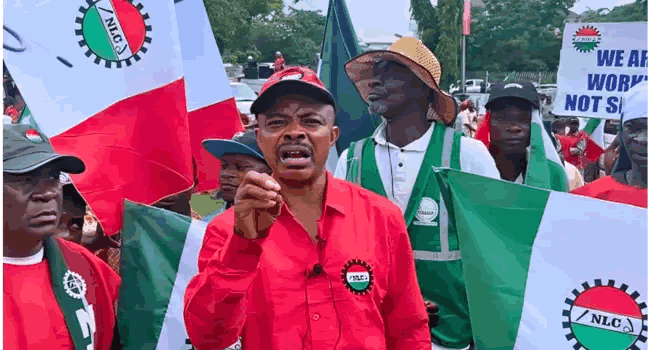At the annual Vanguard Economic Discourse, Nigeria Labour Congress (NLC) President Joe Ajaero and Financial Derivatives Company Managing Director Bismarck Rewane debated the revised minimum wage demand by Organised Labour. The initial demand of N615,000 has been reduced to N497,000. The Presidency has labeled this demand as unrealistic, urging Labour to consider affordability in their demands.
During the summit, Ajaero emphasized the rising costs of essential items and services such as transportation, electricity, and food, arguing that the minimum wage should reflect the current socio-economic realities. He illustrated the impact of inflation on daily expenses and the cost of living, asserting that a living wage, different from a minimum wage, should be sufficient for a family to meet basic needs.
Rewane countered by suggesting that the proposed minimum wage is not feasible. He referenced previous negotiations under former President Muhammad Buhari, where the minimum wage was increased from N18,000 to N30,000, equivalent to about $75 at that time. Rewane emphasized the need for a balanced approach that considers economic stability and avoids inflation.
The tribunal dismissed allegations against Deputy Governor Lawrence Ewhrudjakpo regarding his educational qualifications and certificates, noting that such issues should have been addressed in pre-election litigation. The tribunal ruled that these matters were statute-barred and previously resolved by competent courts, confirming Ewhrudjakpo’s qualifications.
Ajaero stressed that a significant increase in the minimum wage is necessary to match the cost of living index. He criticized current economic policies, highlighting that the devaluation of the naira has severely impacted workers’ purchasing power. He argued that increased wages would boost the economy by enhancing workers’ purchasing power, leading to greater productivity.
Rewane pointed out the complexities of adjusting wages annually based on inflation rates, as practiced in countries like Ghana and the United Kingdom. He expressed concerns about the sustainability of such wage increases without corresponding economic reforms.
The discourse also addressed the government’s palliative measures and the need for comprehensive economic policies. Ajaero criticized the government’s approach to subsidy removal and its failure to implement promised palliatives. He called for the adoption of the Compressed Natural Gas (CNG) policy to reduce transportation costs and overall expenses.
In his closing remarks, Ajaero urged for transparent discussions on Nigeria’s economic challenges, particularly corruption and its impact on reserves. He advocated for practical solutions to address these issues and improve the country’s economic stability.
Rewane highlighted the importance of realistic and sustainable wage policies that consider the broader economic context. He reiterated the need for careful negotiations to balance the interests of workers and the overall economy.
The discussion underscored the ongoing debate between Labour and the private sector over the minimum wage, with both sides presenting arguments based on economic realities and the need for sustainable growth.


